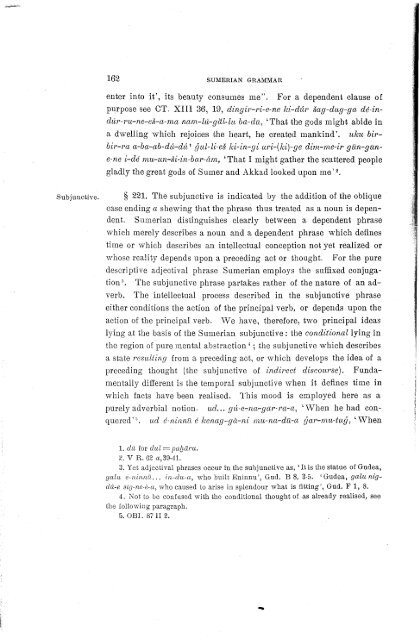- Page 1 and 2:
3NOVS-1l0S-NO'IVH:J 'aNV~U1l3S: ·3
- Page 3 and 4:
ABBREVIATIONS Names oí Principal S
- Page 5 and 6:
ABBREVIATIONS VII SAl. Seltene Assy
- Page 7 and 8:
II PREFACE lonian and Assyrian cult
- Page 9 and 10:
CHAPTER 1. Historical OuUine. § 1.
- Page 11 and 12:
HISTORICAL OUTLINE 3 § 2. The pron
- Page 13 and 14:
HlSTORICAL OUTLINE 5 connected with
- Page 15 and 16:
HISTORICALOUTLINE 7 § 7; The inscr
- Page 17 and 18:
HISTORICALOUTLlNE 9 2. Eannatum; hi
- Page 19 and 20:
BISTORICALOUTLINE 3. Ensagkusanna;
- Page 21 and 22:
HISTORICAL OUTLINE 13 5. Gudea. The
- Page 23 and 24:
HISTORICALOUTLINE 15 Gala kazal-Url
- Page 25 and 26:
HISTORICALOUTLINE 17 5. LibiHstar.
- Page 27 and 28:
CHAPTERII. The Origin and Principal
- Page 29 and 30:
THE ORIGIN AND PRINCIPAL CHARACTERI
- Page 31 and 32:
THE ORIGIN AND PRINCIPAL CHARACTERI
- Page 33 and 34:
THE ORIGIN AND PRINCIPAL CHARACTERI
- Page 35 and 36:
THE ORIGIN AND PRINCIPAL CHARACTERI
- Page 37 and 38:
THE ORIGIN AND PRINCIPAL CHARACTERI
- Page 39 and 40:
THE ORIGIN AND PRINCIPAL CHARACTERI
- Page 41 and 42:
CHAPTER III. The Phonetic Elements
- Page 43 and 44:
l ¡ i J \ THE PHONETIC ELEMENTS OF
- Page 45 and 46:
THE PHONETICELEMENTSOF SUMERIANAND
- Page 47 and 48:
THE PHONETJC ELEMENTS OF SUMERJAN A
- Page 49 and 50:
THE PHONETIC ELEMENT'S OF SUMERJAN
- Page 51 and 52:
THE PHONETJC ELEMENTSOF SUMERJAN AN
- Page 53 and 54:
THE PHONETICELEMENTS.OF SUMERIANAND
- Page 55 and 56:
THE PHONETIC ELEMENTS OF SUMERJAN A
- Page 57 and 58:
THE PHONETIC ELEMENTS OF SUMERJAN A
- Page 59 and 60:
THE DETERMINATIVES 51 1. ~T
- Page 61 and 62:
THE DETERMINATIVES 53 a kind of dru
- Page 63 and 64:
THE DETERMINATIVES 55 ~~nsim = ru(,
- Page 65 and 66:
THE DETERMINATIVES 57 lusirburla-(f
- Page 67 and 68:
THE DETERMINATIVES 59 of Elam. The
- Page 69 and 70:
THE DETERMINATIVES 61 93074, 6, sug
- Page 71 and 72:
INFLECTION AND POSTFIXES 63 By mean
- Page 73 and 74:
INFLECTION AND POSTFIXES 65 § 74.
- Page 75 and 76:
INFLECTION AND POSTFIXES 67 tbe gen
- Page 77 and 78:
INFLECTION AND POSTFIXES 69 bar, 'l
- Page 79 and 80:
INFLECTION AND POSTFIXES 71 25 a 6.
- Page 81 and 82:
INFLECTION AND POSTFIXES 73 beavens
- Page 83 and 84:
INFLECTlON AND POSTFIXES 75 liquor'
- Page 85 and 86:
INFLECTION AND POSTFIXES 77 § 103.
- Page 87 and 88:
INFLECTION AND POSTFIXES 79 went be
- Page 89 and 90:
INFLECTION AND POSTFIXES 81 'upon t
- Page 91 and 92:
INFLECTION AND POSTFIXES regularly
- Page 93 and 94:
INFLECTION AND POSTFIXES 85 propert
- Page 95 and 96:
INFLECTION AND POSTFIXES 87 sá mi-
- Page 97 and 98:
INFLECTION'AND POSTFIXES 89 § 139.
- Page 99 and 100:
CHAPTER VI. Nouns and Adjectives.
- Page 101 and 102:
NOUNS AND ADJECTIVES 93 mar (~T~H~)
- Page 103 and 104:
lO NOUNS AND ADJECTIVES 95 ereated'
- Page 105 and 106:
NOUNSAND ADJECTIVES 97 (only as con
- Page 107 and 108:
NOUNSAND ADJECTIVES 99 18, 19; 28,
- Page 109 and 110:
CHAPTER VII. Pronouns. § 155. Sume
- Page 111 and 112:
PRONOUNS 103 from the independent f
- Page 113 and 114:
PRONOUNS 105 K. 5423, occurs as the
- Page 115 and 116:
PRONOUNS 107 e-ne is really nothing
- Page 117 and 118:
•• ~ A- STATUS OBLIQUUS PRONOUN
- Page 119 and 120: PRONOUNS 111 a, but the force of ha
- Page 121 and 122: PRONOUNS 113 § 168. Sumerian emplo
- Page 123 and 124: CHAPTER VIII. Numerals'. § 170. Th
- Page 125 and 126: NDMERALS 117' only two lsa, and "\
- Page 127 and 128: NUMERALS 119 20. ni8, SCHEIL,ibid.,
- Page 129 and 130: NUMERALS 121 for 1/3 and 2/3 follow
- Page 131 and 132: NUMERALS 123 plied severally to eac
- Page 133 and 134: --- 'to direct the just' 'o (ki) e-
- Page 135 and 136: THE VERB 127 ily derived by adding
- Page 137 and 138: ~' TBE VERB 129 Thus ni, na, hi, ha
- Page 139 and 140: ... ¡ THE VERB 131 be internally m
- Page 141 and 142: THE VERB 1:33 absolute indifference
- Page 143 and 144: THE VERB 135 and the middle voices
- Page 145 and 146: THE VERB 137 in nam-nun-IU sag ma-a
- Page 147 and 148: THE VERB 139 bi indicates a subject
- Page 149 and 150: THE VERB 141 often toward the centr
- Page 151 and 152: THE VERB 143 generally repeated in
- Page 153 and 154: THE VERB 145 si reproduces causativ
- Page 155 and 156: THE VERB 147 ka dü-dé gú-de-a z
- Page 157 and 158: THE VERB 149 1'he majority of compo
- Page 159 and 160: THE VERB J51 directly upon tbe exte
- Page 161 and 162: THE VERB 153 filled with abundance'
- Page 163 and 164: pendent clauses. arad nin-a-ni kena
- Page 165 and 166: THE VERB 157 like the apsu he estab
- Page 167 and 168: thee' 1. ü-ba-ra-e-ne 2 til-la-zu-
- Page 169: THE VERB 161 ag-mu-sú d.nin-in-si-
- Page 173 and 174: THE VERB 165 the great net of Enlil
- Page 175 and 176: THE VERB 167 ation of the future si
- Page 177 and 178: THE VERB 169 sag-ga-ni nu-mu-zu, 'i
- Page 179 and 180: CHAPTER X Conjunctions' . § 229. T
- Page 181 and 182: OONJUNOTIONS 173 § 233. The emphat
- Page 183 and 184: CONJUNCTIONS 175 terror". The conju
- Page 185: The simple form me-e only in syllab
- Page 188 and 189: 180 (12) pa-te-si galu gis-pi-túg'
- Page 190 and 191: 182 SUMERIAN GRAMMAR en dingi¡'nin
- Page 192 and 193: 184 (15) ki-dím ri-ba-ni (16) a-e/
- Page 194 and 195: 186 uso (16) é-nig-ga-za dap' ú-m
- Page 196 and 197: • 188 SUMERJAN GRAMMAR 21. dingir
- Page 198 and 199: 190 -.:::::;;.....::::... __ .~_._~
- Page 200 and 201: 192 55. nig-ur-tab-tab.ba 1 cl·gtr
- Page 202 and 203: 194 35. gís-gar-bi azag-azag-ga-á
- Page 204 and 205: 196 31. gidim-gul a-lá(l)-gul utuk
- Page 206 and 207: 198 26. nam kur-kur.ra tar-ri-da-ni
- Page 208 and 209: -"., 200 ---'~---~- c..'-"-===~''"-
- Page 210 and 211: tr i!p" i"· rl '1 ----------.-----
- Page 212 and 213: 204 SUMERJAN GRAMMAR 1. ASIR, ASER,
- Page 214 and 215: 206 SUMERIAN GRAMMAR 53. bara-::Hga
- Page 216 and 217: 208 SUMERIAN GRAMMAR = nalfaru, bre
- Page 218 and 219: 210 SUMERIAN GRAMMAR DIL, Be concav
- Page 220 and 221:
212 SUMERJAN GRAMMAR 1. DUR, Prince
- Page 222 and 223:
214 SUMERIAN GRAMMAR ambar-ra dú-s
- Page 224 and 225:
216 GIL, GlM, 1. GIN, Be firm, true
- Page 226 and 227:
_.~~~-=-~ 218 ----~------~--_._--._
- Page 228 and 229:
220 Der. nam-gú-slr = 1;;:il}ru. l
- Page 230 and 231:
222 SUMERIAN GRAMMAR IMI-TEG, Rave
- Page 232 and 233:
~ 224 SUMERlAN GRAMMAR KESDA, Bind.
- Page 234 and 235:
226 SUMERIAN GRAMMAR l. LAG, Be cle
- Page 236 and 237:
~ ---~~-- ____ 228 SUMERIAN GRAMMAR
- Page 238 and 239:
230 SUMERJAN GRAMMAR 1. MURUB, Womb
- Page 240 and 241:
~--- ---=- --~.''''-----_._--~".,--
- Page 242 and 243:
----------- -- -~ --- ------- 234 S
- Page 244 and 245:
~..-._- -------_.~ --:-:o"'---~.:--
- Page 246 and 247:
----.....~-~- 238 SUMERIAN GRAMMAR
- Page 248 and 249:
o~ - 240 SUMERJAN GRAMMAIt 3. SIL,
- Page 250 and 251:
:tl ~, 242 SUMERJAN GRAMMAR 2, 6. O
- Page 252 and 253:
'----_. 244 SUMERIAN • GRAMMAR wh
- Page 254 and 255:
246 SUMERJAN GRAMMAR ~'>' -'~- --==
- Page 256 and 257:
248 SUMEHIAN GRAMMAR 1. TUB, To rep
- Page 258 and 259:
250 SUMERIAN GRAMMAR inilu kissati,
- Page 260 and 261:
252 SUMERIAN GRAMMAR 31, 18. Innini
- Page 262 and 263:
254 5' SUMERIAN GRAMMAR who is prot
- Page 264 and 265:
256 SUMERJAN GRAMMAR 3. USAN, Elami
- Page 266 and 267:
258 SUMERJAN GRAMMAR 3. zm, MeaI. z
- Page 269 and 270:
. XXVI, V 83. a SYLLABIC Jj ~ar~~ -
- Page 271 and 272:
il ea). - ~T bar ~- r . bar is not
- Page 273 and 274:
- ~ T~ im dlg lt~~~: ~-- ~~n ~(GU-
- Page 275 and 276:
LIST OF THE MOST IMPORTANT SYLLABlC
- Page 277 and 278:
-r ORIGINAL LIST OF THE MOST IMPORT
- Page 279 and 280:
ly 1/60. g'im gWl , ~- LIST OFANCIE
- Page 281 and 282:
O. 4686 rey. 3.J SUM ug 7 11111 ASS
- Page 283 and 284:
~ I ~CT.XV LlST OF THE MOST IMPORTA
- Page 285 and 286:
~ mTT •.... ~ :'n ~~T~T -v" W~ H
- Page 287 and 288:
~I ( I ~HH ft Sever, ~S ~
- Page 289 and 290:
kur 'it LIST OF THE MOST ASSYRIAN O
- Page 291 and 292:
p " .ll vv ~B ~H~ + ~Tn t:.f + t T~
- Page 293 and 294:
mus mug ~(Gudea) {;-
- Page 295 and 296:
mn ----_._~_.- ---.- ..- * LIST OFA
- Page 297 and 298:
1'UH -~~t LIST OF THE MOST IMPORTAN
- Page 299 and 300:
il á +~B ~~m (?) áSSYRIA:,( A:\CI
- Page 301 and 302:
~ l' l..ln sd ~BmY €7,0 4J~ §::t
- Page 303 and 304:
sigsin sir ck, ~ LIST OF THE MOST A
- Page 305 and 306:
un ul m :--.~ -~--------- - ium I I
- Page 307 and 308:
- ur rr* rmün ~ ;:~ .t'r ur " -.~-
- Page 309 and 310:
zá 302 ASSYRIAN SIGN ANClENT SIGN
- Page 312 and 313:
T INDEX1 a, Signs for, ;¿9, 32. In
- Page 314 and 315:
ha, Alter loan-words, § 22 and p.
- Page 316 and 317:
ADDENDA § 1. Kengin = Nippur. Note
- Page 318:
Page 8, note 1, 1. 2, read occurrin
















